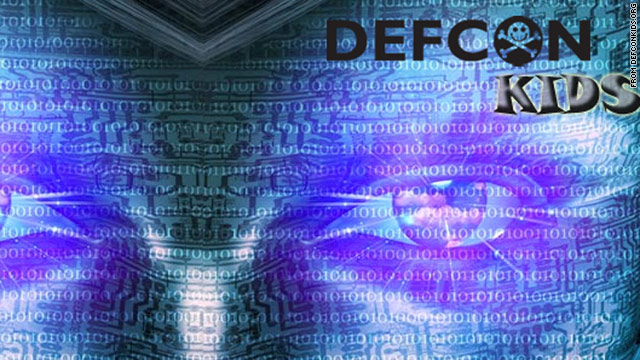DEF CON trains 8-year-olds in hacking

- DEF CON is the world's largest gathering of computer hackers
- This year, the conference held classes for kids age 8 to 16
- DEF CON Kids aims to teach kids to be more secure online
Las Vegas, Nevada (CNN) -- Joseph Horman already had seen the lock-picking videos on YouTube. But it was a different thing entirely for the 13-year-old puzzle-lover to get lessons in lock picking and computer hacking at an event sanctioned by adults.
The world's largest gathering of computer hackers -- DEF CON, which is happening this weekend at the Rio Hotel and Casino in Las Vegas -- held its first-ever hacking classes for kids this year, at an event appropriately called DEF CON Kids.
Sessions in hacking were designed for kiddos ages 8 to 16.
A common parent's reaction to something this might be: They're teaching them what?! But hear these hackers out. Their intentions are good.
Take Horman's uncle, Adam Steed, a computer security professional in Salt Lake City, Utah, who brought his nephew to these training sessions because he already was fascinated with games and coding. (He actually has written his own computer game, called "Blooks," in which players "try to build as many buildings as you can while avoiding enemies," he said.)
"You can watch lock-picking videos on YouTube, but where do you hear the ethical side of this?" said Steed, the uncle. "Not on YouTube."
He added: "I would rather someone learn in a controlled environment. They're going to learn it anyway."
 Massive hack attack hits U.S., U.N.
Massive hack attack hits U.S., U.N.
 Massive hacking operation
Massive hacking operation
Horman, the video game-writing nephew, sat attentively in the second row of a small classroom on Saturday, fiddling with a Rubik's Cube during sessions with titles like "Secrets Revealed," "Meet the Feds" and "Google Hacking."
That last class title is a bit misleading, since instructor-hacker Johnny Long focused more on non-technical hacking -- looking at people's laptops over their backs in airports; picking locks with toilet paper rolls and pen caps; and digging social security numbers out of corporate trash bins -- instead of actual search-engine hacking.
Long went to great lengths to remind the kids in attendance that the point of the class was to teach them what bad guys might be doing -- and how to avoid breaches in their own security or privacy.
"Don't let me catch you guys stealing toilet paper and breaking locks," he said. "If you do, it's not my fault."
Horman said he would only pick a lock if his family got locked out of their own house or car. That's happened before, he said, so that skill might be handy.
"Our family has had some trouble with locks," he said, smiling. "Let's say the younger ones love playing with the key and slipping them under the door."
In the "Meet the Feds" session, representatives from NASA, the Department of Homeland Security, the National Security Agency and the Navy told the kids they were smart to pick up hacking skills early because the government needs employees who can hack.
Several kids raised their hands to ask about hacking as a career path.
Part of the potential confusion about DEF CON Kids comes from the very term "hacker," which people here use to refer to anyone who has the skills needed to modify computer software and hardware. Some hackers extend the domain further, to locks and such.
Those skills could be used for criminal activity, but quite a few DEF CON attendees are actually computer security professionals -- the "good guys" trying to make the Internet less vulnerable to attacks by computer criminals.
Still, all this talk about malicious hacking made 10-year-old Dennis Mikhaylov a bit nervous.
"I'm getting a locker next year," he said after one of the class sessions. He's about to start middle school. "I thought it was cool, but now I'm afraid someone might open it."
Mikhaylov said he'd deal with this by keeping any valuables, which he defined as anything with his address on it; textbooks; and his Nook e-reader, which he apparently carries around all the time, out of that school locker.
The DEF CON Kids event also included a competition, where kids went around the hacker conference trying to break codes and solve puzzles.
Isabel Holland, 10, made up one-half of a team called "Sonic Death-Monkeys," a name she says is "weird" but went with because the boy who was her partner chose it.
"You have to, like, find people, and it's really hard because they're all over the place," she said of one piece of the challenge which required her to search out hackers.
Her dad, Bo Holland, from Austin, Texas, said it's cool for kids to get a chance to see how the technology and video games they use all the time actually work.
Ultimately, it will make the kids safer, he said, especially in this age of social networking, when the collective memory of the Internet has no expiration date.
"You're building up your reputation and it's not going to go away. If you do bad things, that's going to stick with you," he said.
He added: "You can say, 'Oh, we don't want to hear how this (hacking) stuff works and that's scary ... but it's really important kids know how to protect themselves."
